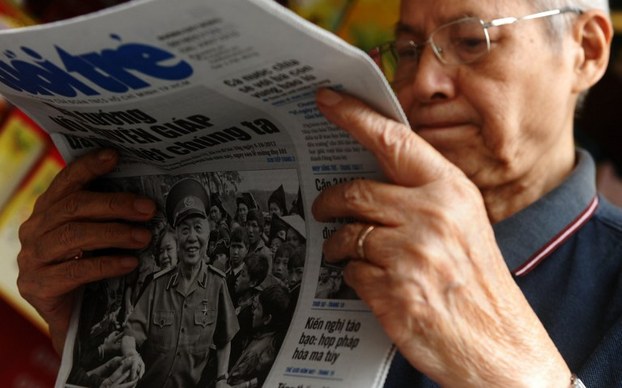Appointment of former provincial chief's son draws rare criticism from Vietnam's state media
| Publisher | Radio Free Asia |
| Publication Date | 29 September 2015 |
| Cite as | Radio Free Asia, Appointment of former provincial chief's son draws rare criticism from Vietnam's state media, 29 September 2015, available at: http://www.refworld.org/docid/561b97d215.html [accessed 19 December 2015] |
| Disclaimer | This is not a UNHCR publication. UNHCR is not responsible for, nor does it necessarily endorse, its content. Any views expressed are solely those of the author or publisher and do not necessarily reflect those of UNHCR, the United Nations or its Member States. |
2015-09-29
 An elderly man reads a local newspaper in Hanoi, Oct. 5, 2013. AFP
An elderly man reads a local newspaper in Hanoi, Oct. 5, 2013. AFP
The appointment of the son of a former provincial Communist Party chief as head of a powerful regional department last week has drawn rare criticism from Vietnam's state media, leading some analysts to suggest the case is at the center of political infighting.
On Sept. 23, authorities in Quang Nam province announced that Le Phuoc Hoai Bao – the 30-year-old son of former provincial party chief Le Phuoc Thanh – would head the regional Planning and Investment Department, making him the youngest director of a provincial department in Vietnam's history.
Following the announcement, several state sponsored media outlets ran articles suggesting Bao lacked the experience necessary to lead the department and questioning the appointment.
The official Tien Phong newspaper last week cited an official with the Quang Nam government as saying civil servants and members of the public were unaware of any achievements or contributions to the province that would qualify Bao for the position.
Speaking on condition of anonymity, the official told the paper that "the only thing people know about him is that he is the son of the [former] provincial party chief."
Online news website Infonet quoted Le Van Cuong, former delegate to the National Assembly – Vietnam's rubber stamp parliament – as saying he had "never known a case where such a young person was promoted to director of a provincial department," adding that the situation "was not normal."
Other state media outlets defended the appointment, including the Law Newspaper of Ho Chi Minh City, which ran an interview with head of the Quang Nam Personnel Department Tran Xuan Tho confirming Bao's selection as "in accordance with current laws and regulations."
The official Labor Newspaper published an article entitled "Talent Does Not Require Maturity," in which it acknowledged the rarity of appointments at such a young age, and said Bao had been chosen because he is "more gifted than others" who might also have qualified for the position.
Bao, who graduated from Da Nang Economics University with a degree in finance, attended Claremont Graduate University in California from 2010 to 2012 before returning to Vietnam to lead the Quang Nam Investment Promotion Unit.
Political infighting
Nguyen Quang A, the former director of the now-defunct Institute of Development Studies (IDS) think tank, told RFA's Vietnamese Service that the varied coverage on Bao's appointment showed the communist party's "inconsistency in managing the media," all of which is state-owned in Vietnam.
"If the case involves people on [the party's] side, [the media] will be quiet, but if the case is about someone on the other side, all media outlets will write about it," he said.
"In this case concerning the [former] Quang Nam party chief's son, they might have some [dispute] going on and they are using the media as a tool."
Quang A said that the media has always been quick to criticize public figures who have fallen from grace within the party, and that no one – not even the nation's top leaders – were safe from such scrutiny.
"Suppose [Prime Minister] Nguyen Tan Dung is demoted. The media will criticize him – that is very common in Vietnam," he said.
"If he is still in power, however, they remain quiet."
Instead, Quang A said, the reporting on Bao's appointment showed an example of "conflict within the party" – instances of which have previously been hidden from public view in order to maintain its absolute authority.
While acknowledging that coverage is being used for political purposes, he expressed hope that increased attention paid to individual cases by state media, as well as by netizens using social media, might "help increase transparency and accountability among the authorities in Vietnam."
Blogger Nguyen Lan Thang told RFA that the controversy over Bao had nothing to do with whether he was a good or a bad candidate, as it was just "showcasing a fight for power."
"This fight is between the communists, because in Vietnam there is only one party," he said.
Thang said that ahead of important events such as next year's National Party Congress in Vietnam, when candidates will be selected for the top positions in the communist party, it was "extremely common for the media to be used as a tool" by bickering factions.
Reported by Viet Ha for RFA's Vietnamese Service. Translated by Viet Ha. Written in English by Joshua Lipes.
Link to original story on RFA website
